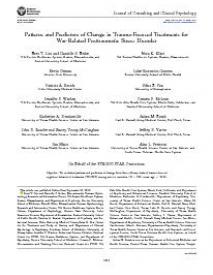Patterns and Predictors of Change in Trauma-Focused Treatments for War-Related Posttraumatic Stress Disorder
Objective: We evaluated patterns and predictors of change from three efficacy trials of trauma-focused cognitive–behavioral treatments (TF-CBT) among service members (N = 702; mean age = 32.88; 89.4% male; 79.8% non-Hispanic/Latino). Rates of clinically significant change were also compared with other trials. Method: The trials were conducted in the same setting with identical measures. The primary outcome was symptom severity scores on the PTSD Symptom Scale—Interview Version (PSS-I; Foa, Riggs, Dancu, & Rothbaum, 1993). Results: Symptom change was best explained by baseline scores and individual slopes. TF-CBT was not associated with better slope change relative to Present-Centered Therapy, a comparison arm in 2 trials. Lower baseline scores (β = .33, p < .01) and higher ratings of treatment credibility (β = −.22, p < .01) and expectancy for change (β = −.16, p < .01) were associated with greater symptom change. Older service members also responded less well to treatment (β = .09, p < .05). Based on the Jacobson and Truax (1991) metric for clinically significant change, 31% of trial participants either recovered or improved. Conclusions: Clinicians should individually tailor treatment for service members with high baseline symptoms, older patients, and those with low levels of credibility and expectancy for change.
What is the public health significance of this article?—Three randomized trials demonstrated that trauma-focused cognitive–behavioral therapies for war-related posttraumatic stress disorder in active duty military personnel had rates of clinically significant change that were substantially smaller than in studies of civilians and not different from Present-Centered Therapy. This study highlights the importance of tailoring treatment for service members with high baseline symptoms, older patients, and those with lower levels of credibility and expectancy for change.
Geachte bezoeker,
De informatie die u nu opvraagt, kan door psychotraumanet niet aan u worden getoond. Dit kan verschillende redenen hebben,
waarvan (bescherming van het) auteursrecht de meeste voorkomende is. Wanneer het mogelijk is om u door te verwijzen naar de bron
van deze informatie, dan ziet u hier onder een link naar die plek.
Als er geen link staat, kunt u contact opnemen met de bibliotheek,
die u verder op weg kan helpen.
Met vriendelijke groet,
Het psychotraumanet-team.
In: Journal of Consulting and Clinical Psychology ISSN: 0022-006X | 87 | 11 | 1019-1029
http://dx.doi.org/10.1037/ccp0000426


